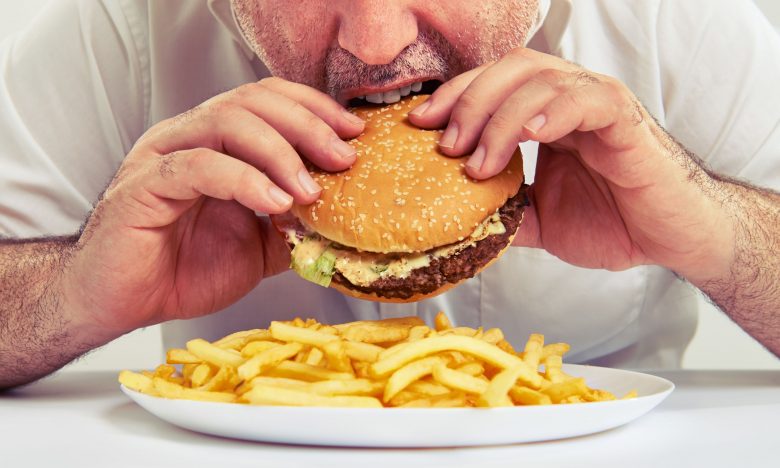The food we eat can either be a stress buster or stress maker. We’ve all had that day when we get home from work, and we are tired, hungry, and stressed out. What better way to overcome these problems than to eat a chocolate bar? The foods we eat can be traced to our moods and behavior and can be linked to weight gain.
If you’ve been struggling with the question of why you’re not losing weight or why you’ve put on pounds in spite of your best efforts, then read on.
Getting Stressed Out with Stress
Stress has been linked to overeating, but what exactly is stress, and how can it cause you to overeat? From a simple physiological perspective, stress is simply a state of arousal. All of us will have been stressed out at some point in our lives. Usually, we have our own ways to cope with the stress and to help us overcome it. For some people, this is exercise or yoga/meditation, whereas others may turn to CBD oil or other natural medicinal products (there is more information on this on the CFAH web page). In spite of several studies suggesting CBD products can help combat stress, their use is not legal in every country. Although, some countries like Cannada have companies that let customers order cannabis Bud By Mail or directly as an over-the-counter product. Only a handful have legalized it for medicinal purposes. Also, it’s not rare for individuals to search for “can CBD raise your stress”, “can you smoke stems“, and similar searches. However, if you do plan to use it, make sure to seek a physician’s advice before starting. Without authorization or if taken in excess of what is needed, it could lead to other added problems.
Also, note that, while dealing with stress, people tend to have less healthy coping mechanisms, like drugs and alcohol or overeating. It’s true that when you’re stressed out, you’re more likely to eat more and have less control over your eating habits. The process of stress may also lead to increased appetite, emotional eating, and the desire to eat and drink things that cause you to crave high levels of sugar, salt, or fat.
Stress is a well-known cause of overeating. It seems that a stressful event has an immediate effect on those present, causing them to respond by eating more. At the same time, the stressor itself can lead to overconsumption down the road – and eventually, lead to obesity.
Obesity is a major health problem and one of the most common chronic diseases in the world. Obesity is more than just weight. In fact, obesity is a symptom of a host of other health problems, including heart disease, diabetes, stroke, and even some forms of cancer. Obesity can have many causes, including genetic predisposition to eating more calories than is necessary. However, it’s not entirely clear why some people eat more than they need, while others are able to eat just what they need.
Explaining the Link
Let’s face it. If we are stressed, we tend to overeat. It’s human nature. But, how come that eating when stressed doesn’t seem to work for everyone? There are several theories floating around as to why this occurs. One of the more popular theories is the “fight or flight” response. This theory basically states that when we are stressed, our bodies release hormones that cause us to feel the urge to either fight or flee. If we eat when stressed, the theory goes, it may cause us to fight because we spend our energy fighting against our bodies’ urge to eat.
The link between stress and overeating is a common theme among nutritionists, dieticians, and other health experts. One reason stress can lead to overeating is that stress can cause changes in appetite. Stress in the workplace, for example, can cause you to seek comfort foods or overeat when you’re around certain people. Stress can also cause you to lose your drive to eat healthy, which can lead to weight gain. Stress can also have physical effects on your body, such as causing you to gain weight.
When you are under stress, your body releases a hormone called cortisol. It is a steroid that causes your blood sugar levels to rise and your blood pressure to rise. This causes you to experience a surge in cravings for high-carbohydrate foods, and you begin to feel hungrier, even though you have already eaten. When you are not under stress, your body produces a hormone called leptin, which signals your brain to stop eating and your body to start burning fat for energy.
Stress is a normal part of life. It can be positive, like when you are excited or anxious about something, or it can be negative, like when you are under pressure at work. Stress can also be both at the same time, like when you are both excited and anxious. In all of these situations, stress can be a problem, but it doesn’t have to be. In fact, many people have learned to cope with stress and simply deal with it, whether that be with medications (like those seen on https://area52.com/delta-8-tinctures/) or by mental adjustments. Unfortunately, others have learned to cope with stress by overeating, drinking too much alcohol, or doing other unhealthy things.
Coping Up with Stress
One of the most common reasons people eat when stressed is because of our bodies’ biological responses to stress. When we are in a stressful situation, our bodies release stress hormones – which help us get through the stressful event – and they release other hormones that make us feel hungry. However, trying to resist eating when we are stressed is easier said than done.
We all know stress can have a very real and physical toll on our bodies. The mind can be an excellent place to start, but the body remains our best and most reliable gauge of how we’re doing.



